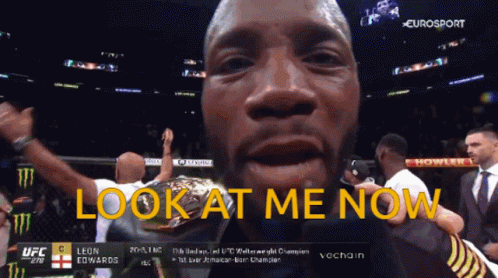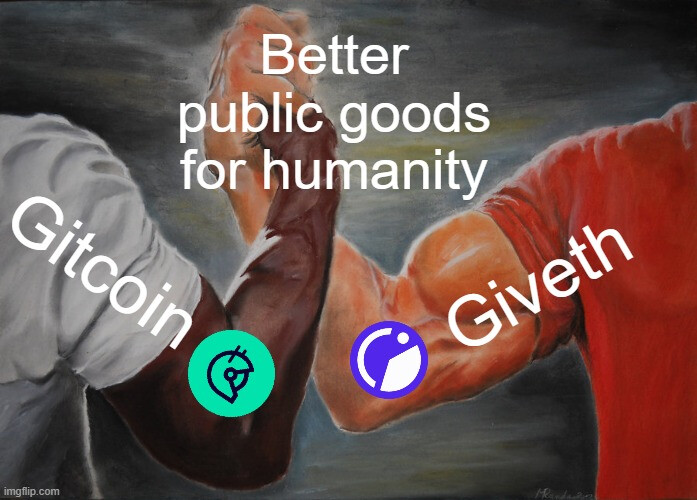GM family!
The purpose of this forum post is to kickstart the conversation around a comprehensive partnership between Gitcoin and Giveth.
TL;DR Coordination mechanisms are high upside for humanity. The design space for public goods is vast and both Giveth & Gitcoin are on the cutting edge of development and implementation in web3. Instead of building separately we can bet on pluralism and explore the design space together to create more shared outcomes and leverage.
Philosophical preamble
“Public goods are good”
We all need and want public goods - non-excludable goods & services like public education, infrastructure, open source software and the environment. Yet the creation & funding of public goods today is poorly coordinated - top-down, dependent on sacrifice, and lacking the necessary feedback cycles that allow for innovation.
Giveth and Gitcoin are both focused on “cracking the public goods nut” using web3 and bring complementary skills to the table. Gitcoin brings a wealth of experience in QF, sybil/collusion protection, and fundraising, has amazing branding and marketing, and a well-funded team building modular coordination mechanisms. Giveth brings DAO expertise, tokenomics experience, great design and development, as well as ready-made coordination mechanisms like GIVbacks, GIVpower and praise.
Giveth Galaxy
Giveth has built a zero-fee crypto donation platform for easy onboarding of IRL nonprofits to web3. It allows for continuous, year-round funding on Ethereum Mainnet and Gnosis Chain. Its project verification system ensures that “verified” projects have proven to be using donations raised to create non-excludable value (aka public goods). It uses donation legos like GIVbacks (rewards to donors of verified projects) and GIVpower (decentralized project curation) to encourage more donations to verified projects, educate about web3 and decentralization, and provide new ways for individuals to support public goods projects they love.
Giveth’s long-term goal is to empower nonprofits with web3 to the point where they could actually become DAOs with their own regenerative microeconomics. This would allow for decentralized governance over the creation of public goods (bottom-up value creation) and regenerative funding streams fuelled by issuance and not donations.
The Giveth Galaxy - including Giveth as well as orgs like TEC, Commons Stack Trusted Seed, and General Magic - have been exploring other web3 coordination tools to support these goals including bonding curves, liquidity mining, reputation, conviction voting and praise.
Gitcoin Galaxy
Gitcoin has built the largest public good crypto funding platform in web3, distributing $72M in total funding, and over $50M through its Quadratic Funding Grants program.
In the last year, the GitcoinDAO built the Gitcoin Passport to bring the best in pluralistic Sybil detection and security to the crypto ecosystem. Passport will not only be a critical component of ensuring legitimacy in the Gitcoin Grants Program, but in all systems that seek to make use of 1 Human 1 Vote collective intelligence mechanisms. Already Snapshot, Bankless, EthStaker, and others have integrated Passport to bring Sybil protection to their communities.
Also, in the last year Gitcoin’s been rebuilding its Grants product as the “Allo protocol”, a decentralized modular funding protocol, and the Gitcoin Grants Stack, a set of dApps to allow any community to run their own grants programs on top of the years of Gitcoin’s experience.
Soft-launching in December 2022, and now with 5 alpha rounds and $2M in funding distributed to causes like OSS, ETH Infra, Climate, and Unicef, the GitcoinDAO is in the final stages of bringing the learnings from the test rounds into the products and preparing for a launch at ETHDenver.
The new Allo protocol is already showing the composability of the decentralized future of Gitcoin with community leaderboards, round dashboards, external analysis of impact, collaborations with Protocol Labs to integrate Hypercerts, Supermodular building a Quadratic Lenster, and more.
There is a high potential upside for humanity, Giveth, and Gitcoin if we pool resources and explore the design space of coordination mechanisms together. Web3 coordination mechanisms that exist today like QF, GIVbacks, GIVpower or Gitcoin Passport are the 1st inning of web3 coordination tools. There is so much further we can go with this, and we should be serious about how we continue to explore this design space.
Interoperability
Gitcoin and Giveth already have great social interoperability (and great memes). We’re super aligned in vibes, and effortlessly seem to coordinate together to produce value for our shared communities. As an example, check out this podcast on coordination mechanisms with Owocki & Griff that led to this extensive piece of work, this blog post and this comprehensive webpage.
There is room to improve regarding technical and economic interoperability. Here are some possibilities for collaboration that we’re already thinking about:
- Running a QF round for Giveth verified projects iterating upon and improving its UI/UX.
- Doing a large token swap for economic alignment
- Using Gitcoin Passport for sybil resistance on Giveth
- Developing a shared project registry so that novel funding mechanisms like QF or GIVbacks can traverse both protocols (allow projects/grants to “opt-in”)
- Allowing projects from grants rounds to be seamlessly onboarded to Giveth to take advantage of year-round funding
- Iterating upon Giveth’s project verification system and using it to support/vet grants
- Using Giveth’s experimentations and research in tokenomics to support GTC
- Sharing DAO governance techniques and best practices for greater efficiency
- Sharing resources from a broad network of organizations including Commons Stack, General Magic (service DAO), praise, pairwise, etc.
Here are some points of possible divergence (divide & conquer):
-
Gitcoin/Supermodular focusing on building on top of grants - new form factors for QF, building a non-EVM quadratic funding tool called “simple grants”, working on R&D (focus on open source and sybil protection)
-
Giveth focusing on improving onboarding on IRL projects into web3 space, working with Commons Stack to build DAO toolkits
Practical Next Steps
As a 1st point of collaboration we are proposing to run a QF round on Giveth. Quadratic Funding has proved to be a very powerful mechanism for onboarding new users into web3, rallying the community around public goods, and generating significant funding for impact projects.
Running QF on Giveth would entail:
- Integrating Gitcoin Passport into giveth.io
- Making an easy application pathway for projects to apply to enter the round
- Designing/building a UI for participation in the round (that doesn’t diverge much from our current donation flow)
- Raising funds for QF matching pool (via donation.eth)
- Compiling tx data for the rounds into a dune dashboard to be used for sybil analysis
- Working with Gitcoin fraud review team team to review data and remove sybil attacks
- Distributing matching funds by performing QF calculations and distributing payouts
Running QF on Giveth would allow us to stack donation legos (GIVbacks & QF together), improve the user experience for both protocols, explore any integration hiccupps to improve passport, and provide a starting point for collaboration between our teams.
I would love to move towards integrating with Allo protocol (Grants Stack) but since this would require bigger changes to our UX (for example, adding a cart feature, and adding smart contract txs admin bro for GIVbacks), and since Allo is still in its alpha phase, this above proposal is an MVP. We should see what changes are implemented for the Beta round, and maintain communication with the Allo team throughout.
With QF as a starting point for collaboration, we can explore the other ideas listed above like tokenswaps, a shared project registry, project verification, etc.
Gimme Yo’ Feedback
“If you want to go fast go alone, if you want to go far go together”
Coordination between our two teams/protocols/DAOs is bound to lead to some technical/social slowdowns, but the potential we unlock from pooling ideas, resources, and teams - and coordinating together around our shared vision - is immense.
This is just a jumping off point for further discussion. I would love to get feedback on any or all of the ideas from members of both Gitcoin and Giveth so that we can align on a clear vision and move towards the future with greater collaboration.
Major /praise to Kevin Olsen, Kevin Owocki & @griff for collaborating w/ me to brainstorm, write & review this forum post.

